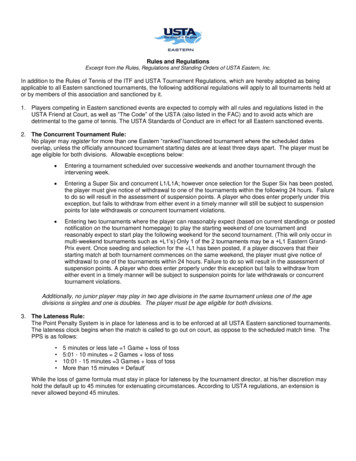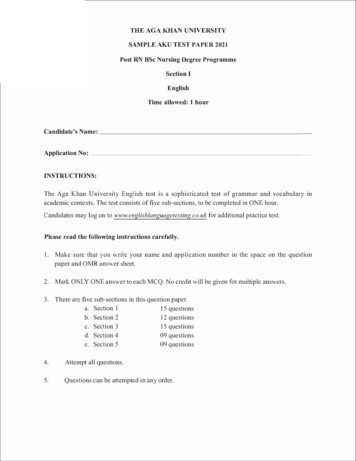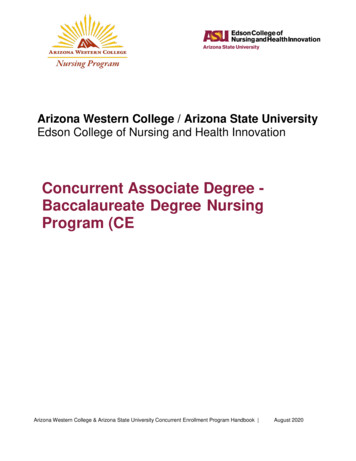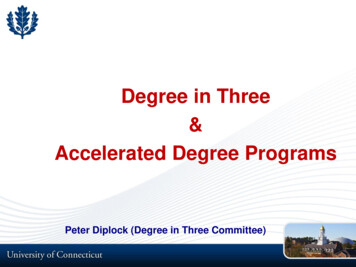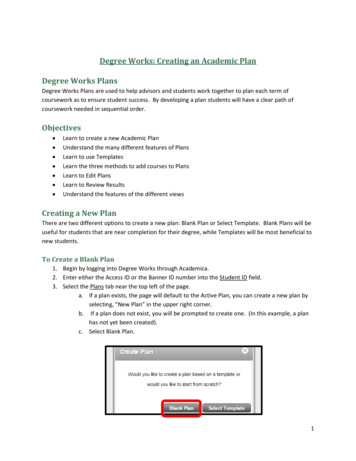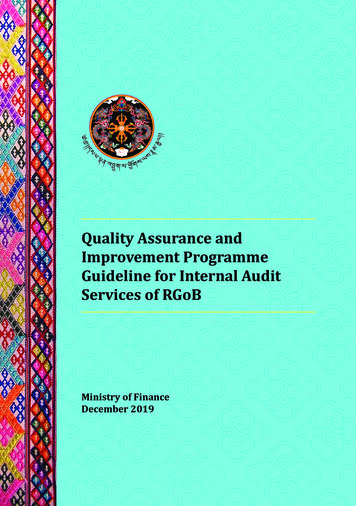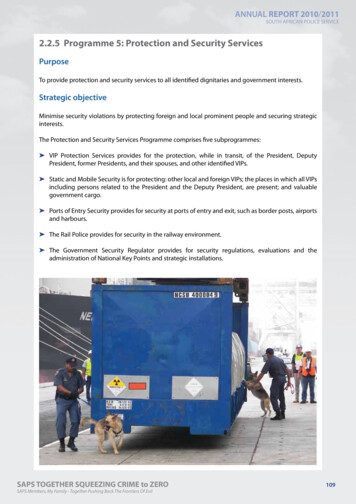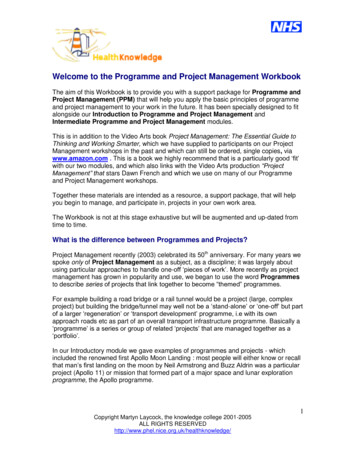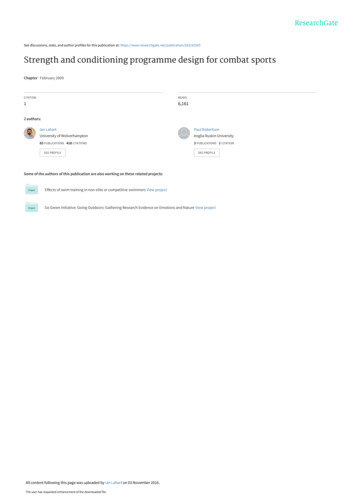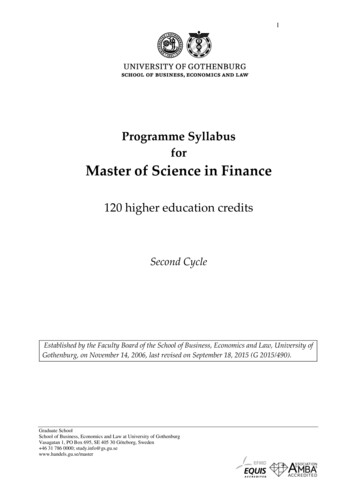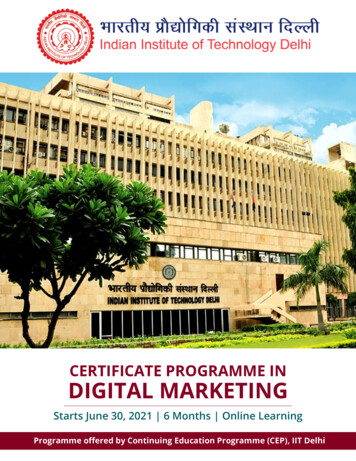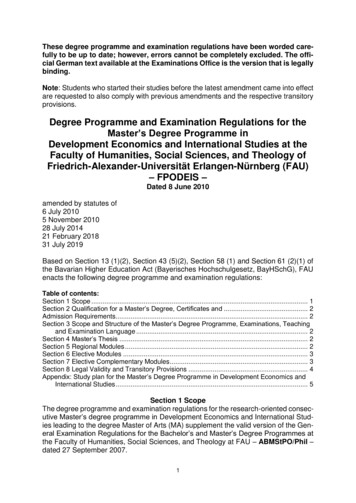
Transcription
These degree programme and examination regulations have been worded carefully to be up to date; however, errors cannot be completely excluded. The official German text available at the Examinations Office is the version that is legallybinding.Note: Students who started their studies before the latest amendment came into effectare requested to also comply with previous amendments and the respective transitoryprovisions.Degree Programme and Examination Regulations for theMaster’s Degree Programme inDevelopment Economics and International Studies at theFaculty of Humanities, Social Sciences, and Theology ofFriedrich-Alexander-Universität Erlangen-Nürnberg (FAU)– FPODEIS –Dated 8 June 2010amended by statutes of6 July 20105 November 201028 July 201421 February 201831 July 2019Based on Section 13 (1)(2), Section 43 (5)(2), Section 58 (1) and Section 61 (2)(1) ofthe Bavarian Higher Education Act (Bayerisches Hochschulgesetz, BayHSchG), FAUenacts the following degree programme and examination regulations:Table of contents:Section 1 Scope . 1Section 2 Qualification for a Master’s Degree, Certificates and . 2Admission Requirements. 2Section 3 Scope and Structure of the Master’s Degree Programme, Examinations, Teachingand Examination Language . 2Section 4 Master’s Thesis . 2Section 5 Regional Modules . 2Section 6 Elective Modules . 3Section 7 Elective Complementary Modules . 3Section 8 Legal Validity and Transitory Provisions . 4Appendix: Study plan for the Master’s Degree Programme in Development Economics andInternational Studies . 5Section 1 ScopeThe degree programme and examination regulations for the research-oriented consecutive Master’s degree programme in Development Economics and International Studies leading to the degree Master of Arts (MA) supplement the valid version of the General Examination Regulations for the Bachelor’s and Master’s Degree Programmes atthe Faculty of Humanities, Social Sciences, and Theology at FAU – ABMStPO/Phil –dated 27 September 2007.1
Section 2 Qualification for a Master’s Degree, Certificates andAdmission Requirements1(1) A subject-specific degree within the meaning of Section 35 (1)(1) ABMStPO/Philis a Bachelor’s degree in business and economics with economics accounting for atleast 70 ECTS credits, including at least fundamental knowledge in the areas of microeconomics, macroeconomics and statistics/econometrics. 2Degrees shall be recognised as subject-related degrees within the meaning of Section 35 (1)(1) in conjunctionwith paragraph (2) ABMStPO/Phil provided the degree programme covered topics relating to business and economics accounting for at least 50 ECTS credits, including atleast fundamental knowledge in the areas of microeconomics, macroeconomics andstatistics/econometrics.(2) 1The application documents shall contain proof of English language proficiency ofat least level C1 of the Common European Framework of Reference for Languages.2Evidence of language proficiency pursuant to (1) can be provided by a certificate forpassing the Test of English as a Foreign Language (TOEFL) or the test of the International English Language Testing System (IELTS) at level C1 or higher or by providingequivalent proof (please refer to the table of equivalence published by the FAU Language Centre).(3) 1Applicants whose subject-specific or subject-related degree, or, in the case of Section 35 (4) ABMStPO/Phil, an average of their achievements hitherto, does not average 2.50 (good) or better shall receive a rejection notification stating reasons for thedecision.Section 3 Scope and Structure of the Master’s Degree Programme, Examinations, Teaching and Examination Language(1) Scope and structure of the Master’s degree programme in Development Economicsand International Studies as well as scope, type and weighting factor of the examinations shall be set forth in the Appendix.(2) 1Notwithstanding Section 5 (5) ABMStPO/Phil, the teaching and examination language in the Master’s degree programme in Development Economics and InternationalStudies is English. 2This shall not affect Section 5 (5) ABMStPO/Phil.Section 4 Master’s ThesisNotwithstanding Section 32 (6) ABMStPO/Phil, the Master’s thesis must be written inEnglish.Section 5 Regional Modules(1) In the compulsory elective ‘Regional Modules’, students gain a more in-depthknowledge of economics with reference to a specific region.(2) 1In the regional specialisation modules, students broaden their subject-specific andmethodological skills in development economics by using theories and empirical concepts they have learnt to analyse the economic situation and developments in a specific region. 2They improve their ability to carry out independent academic work andincrease their expert knowledge on aspects of development economics in the chosenregion.2
(3) 1The type and scope of the examination are dependent on the skills for the chosenmodule according to (2) and the module handbook. 2Examination achievements canbe either a written examination (60–90 min) or a presentation (25–40 min, 33 %) incombination with a written assignment (approx. 15 pages, 67%). 3Examinations maytake a different form from those stated above in individual semester modules offeredby guest lecturers. 4The module handbook is published before the beginning of theseminar in accordance with local practice.(4) 1The modules which can be chosen generally consist of a lecture and a tutorial oran advanced seminar accounting for 2 to 3 SWS and are each equivalent to 5 ECTScredits. 2The exact constellation depends on the specific manner in which the chosenmodule is taught. Please refer to the module handbook for details. 3Any exceptions tosentence 1 are detailed in the module handbook.Section 6 Elective Modules(1)elective modules offered by the Institute of Economics cover the advancedtheory and practice of development economics or international studies. 2After consulting with a study advisor, students may also choose modules from other degree programmes at FAU relating to social sciences and economics as elective modules.1The(2) Elective modules allow students to gain a broader range of more in-depth expertisein the theory and practice of development economics or international studies as wellas their scientific methodology skills in particular regarding empirical applications.(3) 1Section 5 (3) sentences 1 to 4 shall apply accordingly. 2For modules from otherdegree programmes within the meaning of (1) sentence 2, the type and scope of theexamination are determined by the degree programme and examination regulations.(4) 1Section 5 (4) sentences 1 to 3 shall apply accordingly. 2For modules from otherdegree programmes within the meaning of (1) sentence 2, the type and scope of theexamination are determined by the degree programme and examination regulations.Section 7 Elective Complementary Modules(1)the scope of the elective complementary modules, students may choosemodules offered at FAU dealing with international issues that relate to content coveredin MA Development Economics and International Studies. 2Modules which have notyet been taken as a regional specialisation or elective module may be submitted as anelective complementary module. 3Students may also take language courses to improvetheir existing language skills. 4Up to 10 ECTS credits may be awarded for internshipsin business and economics completed whilst studying the degree programme.1Within(2) The objective is that students in the Master’s degree programme gain a broaderrange of more in-depth expertise in important skills which are needed in their futurecareers according to their own interests (subject-specific and methodological skills indevelopment economy and neighbouring disciplines, language skills in preparation forworking in the international environment, vocational experience).3
(3) The type and scope of the examination and the form of the teaching units are dependent on the skills for the chosen module and are stipulated in (5) and (6), the respective degree programme and examination regulations and the module handbook.(4) Modules shall be chosen after consulting a study advisor.Section 8 Legal Validity and Transitory Provisions(1) These examination regulations shall come into effect on the day after their publication.(2) 1The fourth amendment statute shall come into effect on the day after its publication.2It shall apply to all students starting the degree programme from the winter semester2018/2019 onwards.(3) 1The fifth amendment statute shall come into effect on the day after its publication.2It shall apply to all students starting the degree programme from the winter semester2019/2020 onwards.4
Appendix: Study plan for the Master’s Degree Programme in Development Economics and International StudiesSWS (semester hours)Module titleECTScreditsTeaching unitLTECWorkload persemester in ECTS credits11.2.3.4.Type and scope of the examination/course achievementsGradefactorModulegradeWritten examination (60–90 min.)1Written examination (60–90 min., 100 %) orPresentation (25–40 min., 33 %) andWritten assignment (15 pages, 67 %)21Written examination (60–90 min.)1Written examination (60–90 min., 100 %) orPresentation (25–40 min., 33 %) andWritten assignment (15 pages, 67 %)21Written examination (60–90 min.)1Compulsory modules (40 ECTS credits)Development economics IDevelopment economics IIInternational economics IInternational economics IIResearch methods IResearch methods IIInternational business ethics IInternational business ethics IILecture2Tutorial51Lecture and tutorial oradvanced seminarLecture(2)(1)(2)52Tutorial51Lecture and tutorial oradvanced seminarLecture(2)(1)(2)51Lecture and tutorial oradvanced seminarLecture(2)(1)(2)2Tutorial1Lecture and tutorial oradvanced seminar(2)(1)5552Tutorial5(2)5555Written examination (60–90 min., 100 %) orPresentation (25-40 min., 33 %) andWritten assignment (15 pages, 67 %)2155Written examination (60–90 min.)15Written examination (60–90 min., 100 %) orPresentation (25–40 min., 33 %) andWritten assignment (15 pages, 67 %)215Regional specialisation pursuant to Section 5 (10 ECTS)Regional module Isee Section 5 (4)5(5)(5)(5)see Section 5 (3)1Regional module IIsee Section 5 (4)5(5)(5)(5)see Section 5 (3)1Elective module Isee Section 6 (4)5(5)(5)(5)see Section 6 (3)1Elective module IIsee Section 6 (4)5(5)(5)(5)see Section 6 (3)1Elective module IIIsee Section 6 (4)5(5)(5)(5)see Section 6 (3)1Elective module IVsee Section 6 (4)5(5)(5)(5)see Section 6 (3)1Elective modules pursuant to Section 6 (20 ECTS)Elective complementary modules pursuant to Section 7 (20 ECTS credits)Elective complementary module Isee Section 7 (3)5(5)(5)(5)see Section 7 (3)0Elective complementary module IIsee Section 7 (3)5(5)(5)(5)see Section 7 (3)05
Elective complementary module IIsee Section 7 (3)5(5)(5)(5)see Section 7 (3)0Elective complementary module IVsee Section 7 (3)5(5)(5)(5)see Section 7 (3)0Master’s thesis (50–70 pages)1Master’s thesisMaster's thesisMaster’s thesisTotal semester hours and ECTS credits12308-164-800-81203030303030The distribution shown is a recommendation.The type and scope of the examination depend on the specific manner in which the chosen module is taught in the respective semester and are stipulated in the modulehandbook.6
Jun 08, 2010 · Section 2 Qualification for a Master’s Degree, Certificates and Admission Requirements (1) 1A subject-specific degree within the meaning of Section 35 (1)(1) ABMStPO/Phil is a Bachelor’s degree in business and economics with economics accounting for at least 70 ECTS credits, including at least fundamental knowledge in the areas of micro-
